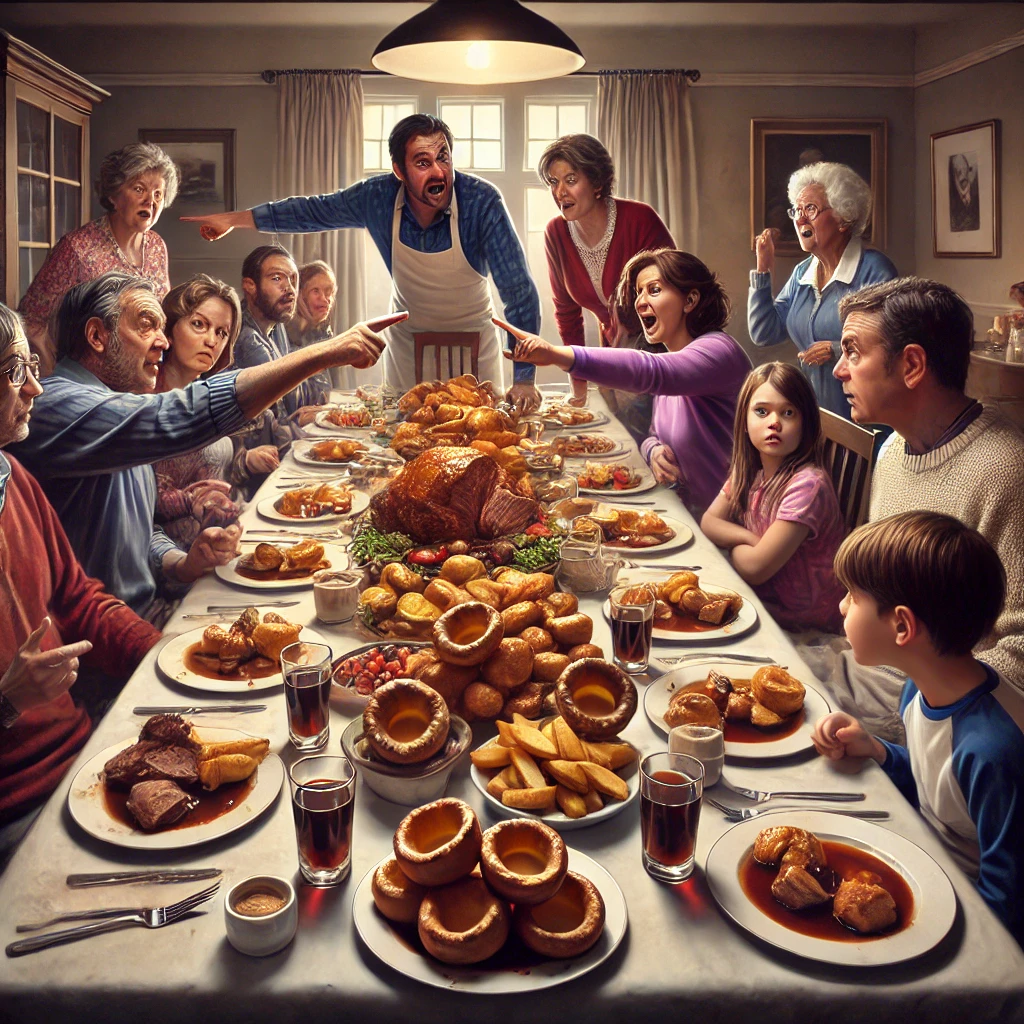Ah, the classic British roast dinner: the pinnacle of our culinary heritage, steeped in tradition, gravy, and suppressed rage. On the surface, it’s a wholesome affair—a gathering of loved ones around a table piled high with meat, veg, and Yorkshire puddings. But for those whose familial bonds are as dry as Aunt Karen’s turkey, it’s an endurance test worthy of SAS: Who Dares Wins. Here’s your foolproof guide to surviving this gastronomic gauntlet with your sanity (and your dignity) intact.
1. Pre-Dinner Reconnaissance
Arrive early (but not too early). You don’t want to be roped into peeling parsnips, but you do want to scope out the seating arrangement. Avoid being trapped between two talkers or, worse, next to Uncle Steve, who will regale you with his conspiracy theories about 5G gravy boats.
Pro Tip: Casually rearrange the seating “to help with serving logistics.” Position yourself near the gravy jug, a psychological buffer for when conversations turn dark.
2. The Silent Judging of the Meat
The roast meat is the centrepiece, and its quality determines the tone of the meal. Is it juicy and golden, or is it doing a spot-on impression of shoe leather? Whisper “Looks a bit overdone, doesn’t it?” to a neutral party—this establishes an early alliance. Be careful, though. If the cook hears you, you’ll be relegated to the non-crispy roasties.
What to Say if It’s Burnt: “Wow, you’ve gone for the smoked effect. Very bold.”
What to Say if It’s Perfect: Nothing. This is Britain. Don’t encourage them.
3. Navigating the Gravy Politics
Gravy is the lifeblood of a roast dinner, but every family has a gravy tyrant—someone who either controls the jug with an iron fist or insists their watery concoction is “just like Mum used to make.” Accept that your ideal gravy thickness will never be achieved here. Smile politely and pour a modest amount.
Advanced Tactic: Secretly bring a sachet of Bisto to thicken up your portion. Blend discreetly, perhaps under the guise of reaching for the mint sauce.
4. Yorkshire Pudding Allocation Wars
There will never be enough Yorkshire puddings. Fact. The key here is strategy. Start with one on your plate to appear humble, then pounce like a seagull when seconds are offered.
Pro Tip: Distract the competition by asking a question about the gravy recipe. While they’re talking, secure the pudding.
5. Avoid Trigger Topics at All Costs
Certain conversations are landmines during a roast dinner. Avoid the following:
- Brexit (even if it’s been years, it will resurface).
- Vegans (especially if the meal includes a nut roast).
- Aunt Karen’s holiday caravan.
If someone brings up a controversial topic, redirect swiftly: “Speaking of politics, did anyone see the weather forecast for next week?”
6. Master the Art of Compliment Deflection
Sooner or later, someone will ask, “So, how’s work/life/your relationship?” This is not a question—it’s an ambush. Be vague but upbeat: “Oh, you know, keeping busy!” Then pivot immediately: “But enough about me—this stuffing is amazing. Is it homemade?”
Warning: This tactic won’t work on Aunt Sue, who will follow up with, “But when are you settling down?”
7. Dessert as the Light at the End of the Tunnel
You’ve made it through the meal. Now comes dessert. This is your chance to load up on sugar and drown out the familial tension with treacle pudding. Be sure to volunteer to “help clear the table” after dessert—it’s a strategic exit to avoid post-dinner chats about local planning permission.
Emergency Escape Plan: If the conversation becomes unbearable, claim you left the oven on at home. No one questions oven-related anxiety.
8. The Exit Strategy
Once dessert plates are cleared and the tea is brewing, it’s time to plan your departure. Use a pre-planned excuse: “I’ve got an early start tomorrow” or “The dog gets nervous if I’m out too long.” Make sure to compliment the cook one last time—it’s the only thing they’ll remember.
Final Words
A British roast dinner isn’t about the food or even the family—it’s a battle of wits, patience, and survival. With these tips, you’ll emerge victorious, your humour intact, and your portion of crispy roast potatoes secured. And remember: no matter how bad it gets, there’s always pudding.
Dwight Warner is the quintessential oddball Brit, with a weirdly American-sounding name, who has a knack for turning the mundane into the extraordinary. Hailing originally from London, now living in the sleepy depths of Lincolnshire but claiming an allegiance to the absurd, Dwight has perfected the art of finding the surreal in real life. Whether it’s a spirited rant about the philosophical implications of queueing or a deep dive into why tea tastes better in a mug older than you, his blogs blur the line between the abstract and the everyday.
With an irreverent wit and a penchant for tangents that somehow come full circle, Dwight Warner doesn’t just write; he performs on the page. His humour is both sharp and delightfully nonsensical, like Monty Python met your nosiest neighbour and they decided to co-write a diary.
Known for being gregarious, Dwight is the life of any (real or metaphorical) party, whether he’s deconstructing the existential crisis of mismatched socks or sharing his inexplicable theories about why pigeons are secretly running the economy.
A larger-than-life personality with a laugh as loud as his opinions, Dwight Warner invites readers to step into a world where everything’s slightly askew—and that’s exactly how he likes it.
Discover more from untypicable
Subscribe to get the latest posts sent to your email.
